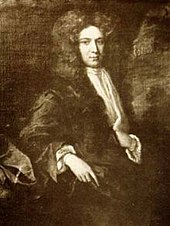Anthony Collins
Anthony Collins (born June 21, 1676 in Heston , † December 13, 1729 in London ) was an English philosopher of the early Enlightenment and contemporary of John Lockes , with whom he maintained a close friendship.
Live and act
He began his education on June 21, 1676 at Eton College and King's College , Cambridge. His tutor at Cambridge was Francis Hare (1671-1740). After that, from November 24, 1694, he studied law at the Honorable Society of Middle Temple in London. He married in 1698 Martha Child (1676-1703), the daughter of Sir Francis Child (1642-1713), a Lord Mayors of London . The couple had three children. From 1715 he lived in Great Baddow ( Essex ), where he was Vice-Lieutenant to Essex, deputy-lieutenant for Essex .
Collins spiritually professed deism , that is, the form of monotheism that assumed the existence of God but denied a divine mandate to prophets to evangelize humanity. For him, ignorance was the basis of atheism and free thinking was his cure. With this, Collins, who initially published his works anonymously, entered into a violent contradiction to public opinion of his time. Above all from the clerical side there was polemic against his views. His spiritual opponents included William Whiston , Bishop Benjamin Hoadly (1676–1761), Samuel Clarke , Thomas Sherlock (1678–1761) and Richard Bentley .
Collins had to flee to Holland several times before the pressure of his opponents . Undeterred by the sometimes harsh criticism of his attitude, Collins remained true to his principles and called for the liberation of thought from all dogmas . He propagated education as the right of all social classes, since he saw in the uneducated the source of social disorder.
Due to the more or less faithful translations of Paul Henri Thiry d'Holbach in the period between 1752 and 1760, his texts and the writings of other English deists found an echo in the French-speaking area.
Works
- Essay concerning the Use of Reason in Propositions the Evidence whereof depends on Human Testimony (1707).
- Priestcraft in Perfection (1709).
- Vindication of the Divine Attributes (1710).
- A Discourse on Free-thinking (1713). Digitized 1 in the Google book search, digitized 2 in the Google book search.
- A Discourse on the Grounds and Reasons of the Christian Religion (1724).
literature
- Georgi Schischkoff (Hrsg.): Philosophical dictionary. Alfred Kröner Verlag, Stuttgart 1982, ISBN 3-520-01321-5 .
Web links
- Stanford Encyclopedia of Philosophy
- Literature by and about Anthony Collins in the WorldCat bibliographic database
Individual evidence
- ↑ a b c Collins, Anthony . In: John Venn , John Archibald Venn (eds.): Alumni Cantabrigienses . A Biographical List of All Known Students, Graduates and Holders of Office at the University of Cambridge, from the Earliest Times to 1900. Part 1: From the earliest times to 1751 , volume 1 : Abbas-Cutts . Cambridge University Press, Cambridge 1922, pp. 373 ( venn.lib.cam.ac.uk Textarchiv - Internet Archive ).
- ↑ Biography (English).
- ↑ Mladen Kozul: D'Holbach et les déistes anglais: la construction of the 'lumières radicales' à la fin des années 1760. In Stefanie Stockhorst (ed.): Cultural transfer through translation. The Circulation of Enlightened Thought in Europe by Means of Translation. Rodopi 2010, ISBN 90-420-2950-1 , pp. 274-297.
| personal data | |
|---|---|
| SURNAME | Collins, Anthony |
| BRIEF DESCRIPTION | English philosopher |
| DATE OF BIRTH | June 21, 1676 |
| PLACE OF BIRTH | Heston |
| DATE OF DEATH | December 13, 1729 |
| Place of death | London |
